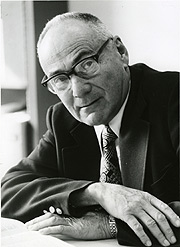Berkeleyan
Obituary
Henrik Blum
![]()
18 January 2006
 Henrik Blum |
Henrik L. Blum, professor emeritus of health administration and planning and a pioneer in health-care reform, died from cardiac arrhythmia on Jan. 3 at his home in Oakland four days after a fall. He was 90.
Considered the father of health planning, Blum saw the need to structure and organize a health-care system that was disjointed, inefficient, and, above all, inequitable.
"Until the passage of Medicare and Medicaid legislation in the mid-1960s, the provision of medical services for the poor and elderly was virtually nonexistent," said Richard Bailey, professor emeritus of health policy and administration and a colleague of Blum's for more than three decades. "The massive infusion of federal funding made everyone aware of critical shortages of physicians, nurses, dentists, and other health professionals, as well as of facilities in which to provide services."
In this environment, Blum envisioned a comprehensive U.S. health system that actively involved consumer and provider participation in decision-making about the types of health-care services to be made available locally, regionally, and nationally.
"Dr. Blum made a major conceptual breakthrough in rational planning for health-care and health-service resources, and that is the idea of locating services where they are going to be needed," said Howard Barkan, a biostatistician and research methodologist at Kaiser Permanente. "As obvious as that sounds now, in the 1960s and 1970s it was radical."
Blum was born Nov. 11, 1915, in San Francisco and was raised on a farm in Napa. In 1937 he earned his B.S. in chemistry from Berkeley. He went on to earn his M.D. in 1942 from UC San Francisco and a master's in public health from Harvard University in 1948. He worked from 1944-1945 as an assistant physician at Johns Hopkins University, and then from 1946-1947 as a fellow at Stanford University.
From 1950 to 1966, Blum served as health officer for Contra Costa County, where he helped establish numerous public-health programs, including vision screening in schools, community mental health, and genetic counseling.
Blum also served as a lecturer at Berkeley's School of Public Health until 1966, when he joined the faculty as a clinical professor. Two years later he became a professor of community health planning. In 1970, Blum established the school's Program in Planning and Policy, chairing it until his retirement in 1984.
Throughout his career, Blum held teaching appointments at Stanford University's medical school as well as at Berkeley. In 1991 he was called back from retirement to serve as interim chair of the Berkeley-UCSF Joint Medical Program, a position he held for three years.
A consultant to or member of numerous committees for the National Institutes of Health, American Public Health Association, U.S. Public Health Service, U.S. Department of Health and Human Services, U.S. Agency for International Development, and the World Health Organization, Blum also served as president of the California Conference of Local Health Officers and the Northern California Public Health Association, and as chairman of the board of trustees of Alta Bates Hospital in Berkeley. In addition to Blum's numerous research publications, he authored three landmark texts on community health and health planning: Public Health Administration: A Public Health Viewpoint, Health Planning, and Planning for Health.
Among his many awards were the 1985 Sedgwick Memorial Medal, the most prestigious honor of the American Public Health Association; the 1985 Schlesinger Award of the American Health Planning Association; and the 1984 Berkeley Citation, one of the campus's highest honors.
Blum was predeceased by his wife, the former Marian H. Ehrich, who died on Oct. 21, 2005; they had been married for 55 years. He is survived by his nieces, Lynda Brothers of San Mateo and Peggy Brothers Cory of Placerville. Donations in his memory can be made to the Henrik L. Blum Fund, San Francisco Foundation, 225 Bush St., San Francisco, Calif., 94104-4224.

